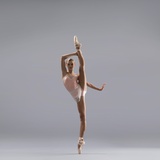Have you heard of Dance Therapy?
I caught up with Erica Hornthal LCPC, BC-DMT, a licensed professional clinical counselor and board certified dance/movement therapist to learn a little more about this unique movement based method of therapy.
She is the Founder/CEO of North Shore Dance Therapy in Chicago, IL.
Do you have a background in dance / what is your educational background?
I have my BA in psychology and my MA in Dance/Movement Therapy and Counseling. I have been dancing since I was 3 years old and danced in high school and college.
What made you go into dance therapy?
I like to say it chose me. I wanted a career where I could combine dance and psychology. It felt like a natural option.
Who is dance therapy targeted towards?
Anyone with mental health needs. It is geared toward anyone who may have trouble expressing him/herself through verbal communication whether it is due to a developmental difference, cognitive impairment, or simply the inability to express emotions.
What is the overall approach?
There are many different approaches, but the idea is that the mind and body are connected and that the body houses all of our experiences. Sometimes talking alone isn't enough and so we have to look to the body and our movement to address our emotional and mental health.
Many dancers, both students and professionals, struggle with anxiety, depression, and other mental health problems. Would dance therapy be beneficial to them?
Absolutely. Dance/movement therapy is simply another approach to counseling. It is not only for people who are experienced movers, but often dancers may have a natural ability to use their bodies for expression.
For dancers looking for a fulfilling career after they're finished dancing, would you recommend looking into the field of dance therapy?
Yes. Dance therapy is a great career that incorporates movement and helping people. If you have a natural ability to listen to people and a need to support emotional health, then dance therapy is a great career opportunity.
Finally, why do you think dance and movement are such effective tools in helping people overcome both physical and mental health issues?
Movement is our first language and the body expresses what the mind suppresses. Our body has all the answers, we just don't always know what the questions is. We can use our bodies' innate knowledge to heal mind and body.
Want to learn more about dance therapy?
Check out North Shore Chicago Dance Therapy.



